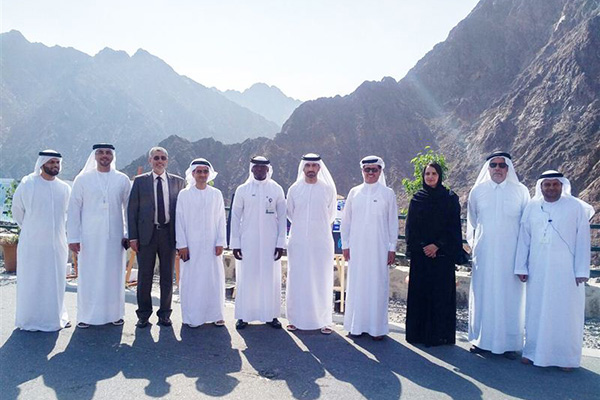
Dewa has revealed details of its initiatives aimed at
supporting the Hatta Comprehensive Development Plan.
Dewa to build GCC’s first hydro-electric power plant
DUBAI, December 20, 2016
Dubai Electricity and Water Authority (Dewa) has revealed its Hatta development projects, including the first hydroelectric power station in the GCC, which will be completed within five years and produce 250 MW.
Other initiatives of the Hatta Comprehensive Development Plan, which involve the installation of photovoltaic panels on rooftops to produce electricity from solar power, and smart meters in buildings, will be completed by the end of 2018. Dewa will also install electric vehicle charging stations in Hatta.
Managing director and CEO of Dewa Saeed Mohammed Al Tayer said: “Dewa’s initiatives in the Hatta Comprehensive Development Plan involve the region’s citizens in our projects, and provide leading and innovative job opportunities. The projects will create 200 permanent technical, administrative and operational jobs in Hatta.”
“The hydroelectric power station, which is the first of its kind in the region, will increase the share of clean-energy use, support the sustainable development of Hatta, and enhance its position as one of the most prominent tourist attractions in the emirate. This supports the Dubai Plan 2021 to make Dubai the preferred place to live, work, and visit,” added Al Tayer.
The hydroelectric power station will generate electricity by making use of the existing water stored in the Hatta Dam, which has a capacity of 1,716 million gallons, and an upper reservoir that will be built in the mountain to store up to 880 million gallons.
The upper reservoir will be 300 m above the dam level. During off-peak hours, turbines that use clean and cheap solar energy will pump water from the dam to the upper reservoir. During peak-load hours, when production cost is high, turbines operated by the speed of waterfall from the upper reservoir will generate electricity that will be connected to Dewa’s grid. The efficiency of power production will reach 90 per cent with response to demand for energy within 90 seconds. The project will provide other services including irrigation, flood control, and storage of fresh drinking water.
Quality initiatives to achieve sustainable development
In addition to the hydroelectric power station, Dewa is contributing to the sustainable development of Hatta through its Shams Dubai initiative, which encourages building owners to install photovoltaic panels to produce electricity from solar power and connect them to Dewa’s electricity grid.
Etihad Energy Services (Etihad Esco), one of Dewa’s companies, will design and install photovoltaic panels for a total of 640 villas belonging to Emiratis in Hatta. Etihad Esco is currently studying the project in terms of its phases, charts, and number of villas that solar panels will be installed on. The project will be completed by the end of 2018.
Dewa is encouraging the use of electric vehicles in Hatta through its Green Charger initiative. Electric-vehicle charging stations are being installed as part of the initiative to motivate the use of the environmentally-friendly electric vehicles.
Currently, there is a charging station at Dewa’s Customer Happiness Centre in Hatta. Dewa is working on installing other Green Chargers in the region.
Dewa is also working to install smart meters in buildings in Hatta according to the latest international systems through its smart meters and grids initiative. Smart metres, which provide advanced features through smart applications, enable customers to monitor and control their use, connection speed, and other innovative features that promote a smart and green lifestyle. The project will also be completed by the end of 2018.
Dubai Clean Energy Strategy 2050
Dewa is working to implement the Dubai Clean Energy Strategy 2050, which aims to provide seven per cent of Dubai’s total power output from clean energy by 2020, 25 per cent by 2030, and 75 per cent by 2050.
One of Dewa’s key projects to achieve the strategy is the Mohammed bin Rashid Al Maktoum Solar Park, the largest single-site solar park in the world. The park, which has a planned capacity of 5,000 MW by 2030, is expected to involve a total investment of Dh50 billion ($13.6 billion). When completed, the solar park will save 6.5 million tonnes of carbon dioxide annually.
The Dh1.3 billion ($353.9 million) Hatta Comprehensive Development Plan aims to boost the area’s social and economic attractiveness as a world-class environmental tourist destination. It covers three key areas including the economic and service sector, tourism and sports, and culture and education.
A dedicated board will oversee the plan and co-ordinate with various government organisations. It has been constituted with people from Hatta as members to ensure it is fully aware of the development requirements of the area. – TradeArabia News Service







